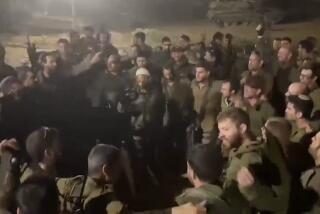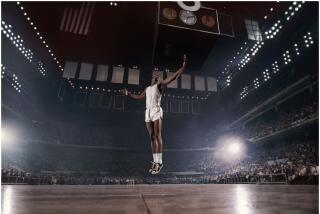The Latest Salvo in War of Sound-Bites : Gulf Crisis: Saddam Hussein does a bit of grotesquerie for the TV cameras. But he’s far from being alone in this battle of easily absorbed images.
- Share via
Iraqi President Saddam Hussein comes on in mufti for a specially televised appearance with a group of Western captives in Baghdad, including, of course, some children. “We want you to be safe,” he tells his involuntary guests.
One thinks of grainy old images--of a smiling Josef Stalin patting the head of some peasant girl while he sends her parents to the gulag, of Adolf Hitler on his flower-strewn way through the Sudetenland for his last territorial demand, of Richard Nixon telling war protesters that he is ending the war as U.S. troops pour into Cambodia. These staged displays are timelessly ugly, and full of irony.
Yet there is something all too contemporary, and even more savage, symbolized in Hussein’s bit of grotesquerie. This was only the latest salvo, after all, in the media war we call the Persian Gulf crisis.
It is a conflict that bridges all gaps. The inscrutable Middle East meets Kennebunkport in the common idiom and expedience of video diplomacy. Like its precursors, the soap opera or campaign ad, the media war and its messy geopolitics are reduced to easily absorbed images.
So it has been with George Bush, a President of the United States with his own guns of August, now playing an awkward round of golf, now drawn up in herringbone jacket and equally stylish truculence before the vigilant CNN crew, making policy and history to fit the quiet whine of cartridge tape and satellite signals.
Bush’s roly-poly tout and chief of staff, John Sununu, assures us that the President is on top of the media war, and not off (like poor, untutored Jimmy Carter), “brooding” in the Oval Office, which might be confused with rethinking one’s acts.
Thus, like Hussein extending hospitality to his prisoners, we have gradually, almost imperceptibly, escalated our war aims with each new shoot on the summer White House lawn--from defense of Saudi Arabia to the reconquest of Kuwait to the overthrow of Saddam Hussein and the establishment of a more polite and pliable Iraqi regime. One wonders if American troops in the desert would see in presidential press conferences the same ironies we saw in Hussein’s grim mustering in Baghdad.
What has been produced, in any event, is some of the most mindless and tragic jingoism in American history. What has been lost is any serious understanding fo the convoluted politics, economics and history of this mad confrontation. If American blood is spilled, never will our men have shed it--not even in the worst convenience of empire--with so little public knowledge of the genuine reasons why.
But at least the omnipresent, obliging television cameras reveal something--the frightening improvisation of it all, the occasionally unconcealable strain of two weak, posturing protagonists, facing off over banks of lights and microphones, their arsenals of poison and missiles mercifully and discreetly off camera.
Perhaps the next century will call this the sound-bite war, or the video expedition. It will make the body bags--already stockpiled in Arabia--so much less noticeable when they begin to come home.
More to Read
Sign up for Essential California
The most important California stories and recommendations in your inbox every morning.
You may occasionally receive promotional content from the Los Angeles Times.













